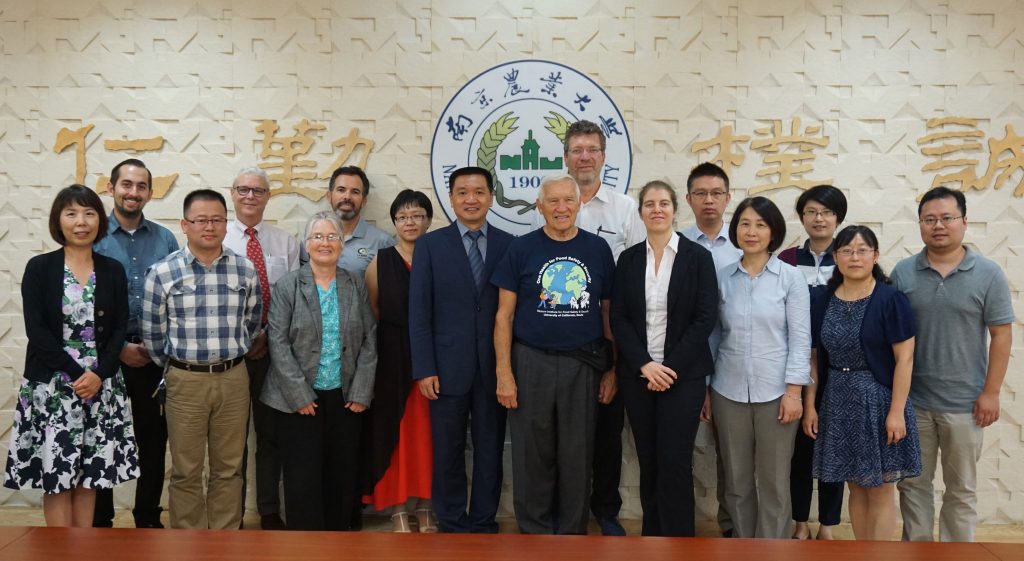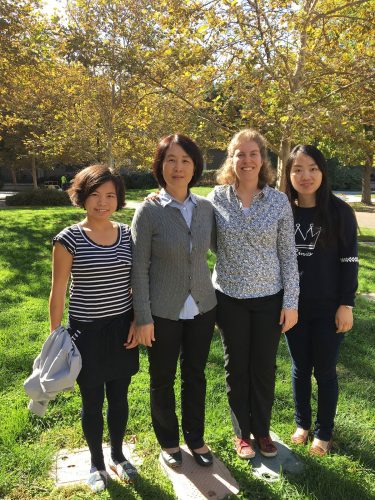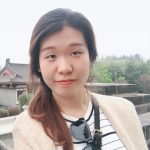International Collaboration A Framework for Health
Chris Brunner, November 7, 2017

NAU, UC Davis, and Wageningen University meet in Nanjing for a One Health for Food Safety Workshop
A rising generation of students passionate about finding solutions to problems impacting the health of people, animals, and the environment are the apprentices being mentored by faculty with equal passion and vision for a healthy planet. Faculty from multiple backgrounds, teaching various technological approaches, are lighting the fire of discovery in the future leaders of the proposed One Health Center for Food Safety and Animal Health at Nanjing Agricultural University (NAU).
The Center will foster education and research in areas including agricultural and environmental sciences, food science, nutrition, soil science, veterinary medicine, animal science, ecology, epidemiology, public health, and crop quality.
Building a framework
Faculty collaboration is the framework for the Center. Workshops and conferences sponsored by WIFSS build that framework. These settings provide the platform for faculty collaboration which produce joint research projects. These projects provide training opportunities for the graduate students who will become the faculty who make up the core of the Center.
Research projects for graduate education supports the ongoing agreement between the School of Veterinary Medicine, College of Agricultural and Environmental Sciences, and WIFSS, to form an educational exchange program with NAU.
The NAU-UC Davis One Health and Food Safety Workshop held, September 18-20, 2017, in Nanjing, helped facilitate collaborative research projects between UC Davis, Nanjing Agricultural University, and Wageningen University & Research.
The faculty who assembled in Nanjing for the workshop included UC Davis College of Agricultural and Environmental Sciences professors Trish Berger and Jorge Rodrigues, and School of Veterinary Medicine professors Beatriz Martínez López, Richard Pereira, and Robert Poppenga. Dr. Ed van Klink represented Wageningen, and participating from NAU were professors Feng Hu, Jianjun Dai, Jie Chen, Ruibing Cao, Jiarong Xu, Haiyan Ren, and Bo Xiong. The workshop teams focused on a variety of topics including epidemiology, toxicology, reproductive biology, antibiotic use and resistance, and soil biology and biomes.
Collaboration in action
Dr. Jorge Rodrigues, a participant in the Prataculture, Rangeland and Soil Science workgroup, along with NAU colleague, Haiyan Ren, are working to develop tests for grazing intensity. Gui Weiyang, a graduate student who will be working under their direction, will be involved in studies that will provide expertise on analyzing soil microbial diversity which will assist in determining recommendations for grazing intensity. This is an example of the workshops’ long term goals. Plans are underway for a joint publication.
Dr. Liping Wang and Dr. Richard Pereira, formed the workgroup for Antibiotic Resistance. Dr. Wang has expertise in antimicrobial resistance in mastitis causing agents. Dr. Pereira has research expertise in the evaluation of drug residues in waste milk at dairy farms in China, which is of growing relevance worldwide. A long range goal is to provide funding for a graduate student under the joint mentorship of Wang and Pereira.

Drs. Jiarong Xu and Beatriz Martínez López (center) meet for the first time during the spring 2016 workshop held in Davis. Here they are with graduate students from NAU who participated in the workshop.
Another example of the breadth of the workshop discussions is reflected in the Epidemiology workgroup which included Drs. Beatriz Martínez López, Ed van Klink, Jiarong Xu and Shuo Su. NAU undergraduate and post graduate students, both Master and PhD level, presented some of their work to the group. Several projects on animal diseases as well as zoonotic diseases were presented by the students. Some projects were on rabies, still a major problem in China and a target for control. Also a project on feline calicivirus was presented and some work on porcine viruses.
Potential areas of cooperation between NAU, Davis, and Wageningen were explored. In particular, areas such as risk assessment, modeling, epidemiology teaching, and data management were highlighted. Cooperation between the universities would benefit NAU in strengthening epidemiology as a core class in their veterinary curriculum. This will help build capacity for the One Health initiative.
Dr. Martínez López was encouraged by the positive exchange of ideas and feels that only with strong epidemiology skills and a more holistic, One Health, approach, China and the entire world will be able to address the challenges ahead on emerging infectious diseases, food safety and public & environmental health.
She enthusiastically emphasizes, “This cooperation will contribute to the training of the next generation of veterinarians in those important aspects.”
Supporting the framework

Yitong Huang, a student from NAU, is participating in the 3+X One Health program, working toward a MPVM degree, and being mentored by Dr. Martínez López.
Dr. Bennie Osburn, Director of Outreach and Training, and Ms. Jenny Chen, Public Relations Assistant, WIFSS, headed a meeting about the newly approved 3+X program for NAU undergraduate students now offered through UC Davis Office of Global Affairs. This program is an opportunity for NAU students to take upper division courses at Davis to complete the MPVM or a non-thesis MS degree. This is the first of its kind dual degree program between NAU and UC Davis. Getting this program underway allows for NAU students to work with faculty mentors at UC Davis on a common research area.
Ms. Chris Brunner, Public Relations Officer with WIFSS, and Dr. Osburn, addressed more than 100 undergraduate students about the progress of WIFSS’ One Health conferences, and the remarkable growth of NAU’s Student One Health Club. During the UC Davis undergraduate conferences, students are exposed to the possibilities of graduate education opportunities at Davis. Many students in the audience gave enthusiastic testimonials on the impact the conferences have made on their career goals. One Health Youth are expanding the initiative to other universities throughout China. A high percentage of the conference attendees go on to be accepted into graduate programs at top universities around the world.
Long term goals

Dr. Bennie Osburn mentors students during 2017 summer One Health conference at UC Davis
“The ultimate goal is far reaching,” explains Dr. Osburn.
Osburn believes that through relationships established by students meeting at conferences and forming One Health Clubs, and by faculty collaboration instigated through workshops, WIFSS is addressing a safer and more secure food supply.
He is enthusiastic at the prospect that, “With mentoring from visionary faculty, graduate students will go forward to be the leaders in the One Health Center.”
